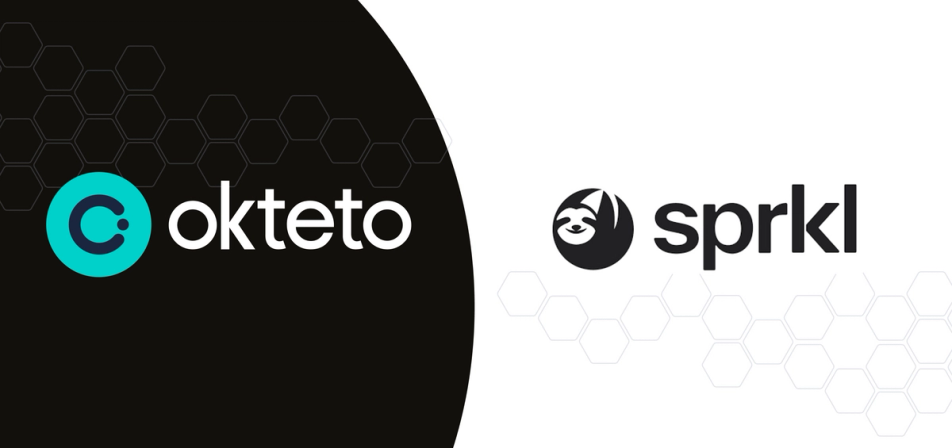Cloud Native Development Made Easy With Sprkl and Okteto

Integrations With Okteto (8 Part Series)
- Cloud Native Development Made Easy With Sprkl and Okteto
- Using LaunchDarkly and Okteto To Automate Modern Feature Flag Management
- Developing Cloud-Native Apps With MongoDB Atlas and Kubernetes
- Using ArgoCD With Okteto for a Unified Kubernetes Development Experience
- Making Your Helm-Packaged Applications Ready for Cloud Native Development with Okteto
- Automate Provisioning Any Dev Resource on Any Cloud Provider With Pulumi and Okteto
- Automating Development Environments and Infrastructure with Terraform and Okteto
- Enhance CI Pipelines with Dagger and Okteto Preview Environments for a Better Developer Experience
Our applications are getting increasingly complex with time. This is causing a lot of problems for developers, from having to spend hours configuring their dev environments to not being able to fully understand how the code they write affects the entire application. In this blog, we’re going to see how Sprkl and Okteto can be used together to solve a lot of these problems!
Join Us for Our Webinar Showing Using Sprkl and Okteto Together
The Problems Plaguing Modern Applications
The applications we code these days consist of a large number of microservices. No doubt that this approach is much better and scalable than the monoliths we were coding earlier, but this microservices-based architecture has also led to some new problems for developers.
Traditionally developers would only have to run a command or two to bring up a monolithic application. But with microservices, a lot of configuration needs to be done to bring up all the services you require for development. Another problem is that even when you bring up these services locally, your dev environment is still nothing like the production Kubernetes clusters you’re running. Having developers spend time configuring a realistic production-like environment for development takes a huge hit on productivity and leads to a poor developer experience.
Another problem of modern application development is that it has become tough for developers to judge the impact of the code they write on the entire application. Identifying issues with your code earlier in the dev cycle is becoming crucial in order to ship changes faster. Giving developers tools that allow them to be self-sufficient and more productive is the secret ingredient to creating a wonderful developer experience in your organization. Let’s see how Sprkl and Okteto can help you achieve this!
Modern Dev Tools for Modern Applications
Okteto allows developers to skip all the headaches of configuring a production-like development environment and get right to the code-writing phase. With Okteto, you can develop your applications directly in a Kubernetes cluster and see the changes you make in your code reflected live as soon as you hit save! This solves one-half of the problems we discussed above.
The second half is where Sprkl shines. Sprkl allows you to immediately judge the impact of the code you write on the entire app. It does so by leveraging OpenTelemetry to automatically instrument code changes and analyze them upon execution. This helps you write code with the confidence that things would not go wrong in production. You’re able to identify potential issues much earlier and fix them. Feedback provided by Sprkl includes traces on the code level, insights about hidden API calls, DB queries, and memory bottlenecks, among a lot of other things!
The inner dev loop refers to a single developer's workflow when working. It encompasses all the things developers do before committing and pushing their code. This makes up the core of developer experience and often is the bottleneck for dev productivity. Shortening the inner dev loop is the secret to unlocking dev productivity. If the inner dev loop your developers have to go through is frustrating and doesn’t provide genuine feedback, then the dev experience across your organization will no doubt be bad. Both Okteto and Sprkl improve this inner dev loop by giving developers access to all the things they need the most:
- instant and genuine feedback in a production-like environment
- analysis of the effect of their code on the overall application
See It in Action
I’m sure by this point you must be wondering how you can use these two tools together. Marom Bracha recorded a demo showing you exactly that. Go check it out to give a boost to your developers’ workflow and simplify the development process for them!
Once you’re done watching the video, why don’t you go give it a try yourself to see the magic? The code in the video can be found on GitHub here.
Integrations With Okteto (8 Part Series)
- Cloud Native Development Made Easy With Sprkl and Okteto
- Using LaunchDarkly and Okteto To Automate Modern Feature Flag Management
- Developing Cloud-Native Apps With MongoDB Atlas and Kubernetes
- Using ArgoCD With Okteto for a Unified Kubernetes Development Experience
- Making Your Helm-Packaged Applications Ready for Cloud Native Development with Okteto
- Automate Provisioning Any Dev Resource on Any Cloud Provider With Pulumi and Okteto
- Automating Development Environments and Infrastructure with Terraform and Okteto
- Enhance CI Pipelines with Dagger and Okteto Preview Environments for a Better Developer Experience


 Arsh Sharma
Arsh Sharma